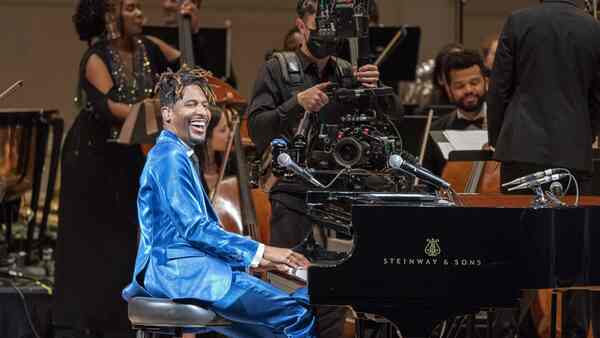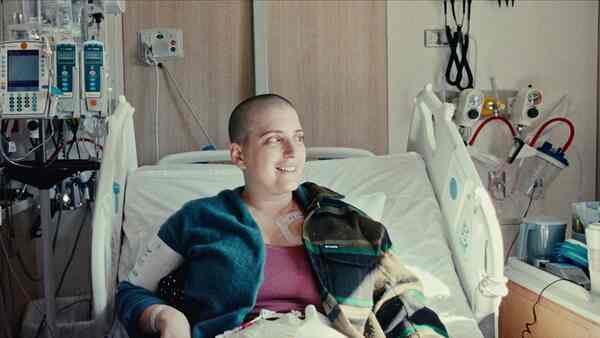Netflix's American Symphony Is A Profound Ode To The Musicality Of Life
This is #CineFile, where our critic Rahul Desai goes beyond the obvious takes, to dissect movies and shows that are in the news. Today: Jon Batiste and Suleika Jaouad's American Symphony.

Last Updated: 06.03 PM, Dec 04, 2023
This column was originally published as part of our newsletter The Daily Show on December 4, 2023. Subscribe here. (We're awesome about not spamming your inbox!)
***
IN the documentary American Symphony, there’s a moment that transcends the relationship between viewer and screen. A musician announces one last act during a sold-out performance. It’s just him and his piano. Before he begins, he dedicates it to a person. Not just any person — his wife. She has been sick. He’s been by her side. Right now though, he’s on stage. For the audience, she is just a name. He takes a deep breath, closes his eyes — and pauses. The camera stays on him, quivering, moving, as if in anticipation of sound. But this silence stretches into eternity and a day. His stillness is unnerving. Has he frozen or forgotten?
If you look closely, this pause brings alive an unfilmable passage. He has not forgotten, he is remembering. One can almost smell the ache he’s harnessing; one can almost touch the melancholy surging from heart to hand; one can almost see the translation of life into art. It’s happening before our very eyes. He’s making it accumulate. The music, eventually, becomes him. The piano — both phonetically and spiritually — consumes his pain. A scene from Interstellar comes to mind. It’s when Cooper gets sucked into the black hole, into the tesseract, where time itself is a physical dimension. Cooper goes just deep enough to transmit crucial data to his scientist daughter — and leaves. The musician in this documentary, Jon Batiste, does the same in his endless pause: He creates from the darkness without getting consumed by it. He thinks of the courage and suffering of his wife, Suleika Jaouad. He turns time into a physical dimension, but knows when to exit. The result is hypnotic. He made everyone listen, now he’s listening.

That’s what Matthew Heineman’s documentary does so seamlessly. It follows Jon Batiste across a year of dizzying highs and crippling lows. Yet, the symbiotic link between the professional and the personal — between joy and sadness; making and breaking — is always visible. This is a year in which Batiste wins multiple Grammy awards (including Album of the Year), plays to packed houses, bows out of his role as bandleader at Late Night with Stephen Colbert, and most of all, composes and performs his first symphony. He breaks new ground as a Black artist in every way possible. This is also a year in which Suleika’s leukemia has returned after 10 years. She’s back in the hospital, doing her chemo and hurtling towards a bone-marrow transplant. She was diagnosed the day he was nominated for 11 Grammys. She is readmitted the night he wins 5.
When he’s travelling — and he must, because they share the belief that music emerges from life experience (“social music”) — she is enduring. Their video calls unfold like a voice in his head while he rehearses, sleeps, prays, entertains, sings and sets about his destiny. She doesn’t mind him being away, because she knows that he’s chiselling their limbo into something meaningful. Meanwhile, survival is her creative act. She takes up painting, but it’s clear that he becomes her canvas. Not an hour passes when his feelings aren’t traced by hers. Not a minute passes when his words aren’t coloured by her world.

The film-making merges Batiste’s public persona and private character with great empathy. At one point, we see him being fitted with a tuxedo at a store. He’s on a phone call with her — she’s choosing between dresses and soliciting his opinion on them. At first, we assume that they’re sprucing up to walk a red carpet or attend an awards function. Cut to: Jon Batiste and Suleika Jaouad getting married in a tiny ceremony, a handful of friends as their witness. That’s what the clothes were for. It’s not his big day — it’s theirs. It’s not his story alone — it’s theirs. It’s a lovely ‘scene,’ one that conveys the compassion of two artists whose togetherness is indirectly shaping music lovers across the globe.
Later on, while watching Batiste sweep the Grammys on television, Suleika’s mother is so excited that she instinctively turns to her daughter and asks: “Will you marry him now?!” Suleika mutters that she already has. It’s a blink-or-miss moment, but it reveals how healing — much like suffering — can distort the emotional grammar of reality. It’s not a lapse of memory so much as a wave of merry disbelief: Is this really happening? Am I really married to this man? In his acceptance speech, Batiste touches upon the subjectivity of an artform — and how it thrives by reaching strangers at the exact time they need it the most. There is no ‘best’ or ‘worst’. Honest music is universal and intimate at once; they make the listener feel seen and heard — like it’s composed only for them.

This subjectivity is also what makes American Symphony such a special documentary. Batiste’s disarming honesty replicates the cultural impact of his music. For instance, all through, I couldn’t help but feel that the film was reaching out to me. That it existed, in parts, only to help a reclusive writer at the other end of the planet. It’s uncanny. In this year, at this hour, at this very moment, the journey of American Symphony is precisely what I needed to see. It’s a soothing hand on the shoulder — a reassuring reminder of the umbilical cord between being and creating.
I’ve spent much of this year wondering whether I write for a living or live to write. I’ve wondered if I feel certain emotions and go through certain events hoping that, ultimately, an essay might emerge from them. I’ve been grieving the loss of a loved one, but I’ve also felt a tinge of guilt every time I write about it: Am I “milking” my life for content? Am I just another version of people who’re too busy photographing a new place to fully experience it? Am I at the risk of getting consumed by my darkness before relaying the data back to my brain? That scene in Steven Spielberg’s auto-fictional drama, The Fabelmans, keeps haunting me. In it, a teenager watches his parents get into a screaming match, but all he can imagine at that point is filming them with a camera. He’s mentally capturing the moment instead of physically intervening. His sisters implore him to do something. But perhaps he knows that, five decades later, this will be the defining scene of a memoir-like film he makes.

But watching Jon and Suleika so steadfastly preserve their identities is like watching two tellers trust the integrity of their story. They know that every single second lived — no matter how mundane or dramatic — will find its way into their art. They don’t have to go looking for it. The music is inevitable. When he takes that long pause before his final piece, he is summoning the inspiration. He is seeking the moment before it has the chance to seek him. That’s why we see his face — the effort, the pulling, the strength — and not the inside of his head. That’s why the camera doesn’t know where to go.
The documentary comes full circle in its final scene. At the Carnegie Hall premier of his orchestral composition (“American Symphony), the power goes out halfway through. The instruments go silent. The stage loses its sound. Batiste’s conducting stops. He notices the confusion in the audience. And instead of waiting for the issue to be resolved, he turns to his old friend, the piano. Except this time, there’s no pause. He launches into a scorching solo. His musicians watch him in awe. The artistic practice morphs into a spiritual reckoning. He gets lost in his performance — in his conversation with his past, present, future and everything in between. This time, we see the inside of his head. Because the moments come to him. He doesn’t have to try anymore. It’s a montage-rush of footage and images and memories: New Orleans, his street gigs, clubs and shows, jamming with Stevie Wonder and Lenny Kravitz, The Late Show, his Oscar win, the Grammys, Suleika, her cancer, the hospitals and ambulances, the wedding, the hope.

Every note on the piano has a corresponding history. Every sound becomes the descendent of silence. In those few minutes, he becomes the perfect aggregate of his talent and trauma, of his highway and pitstops. By letting the inevitability of life shape his solo, he is letting the symphony of America reveal his music. Some people hear a country on that stage. Some hear themselves. And some see an artist turning faith into a physical dimension. I saw a man who creates out of thick air, goes back home, shares a meal with his wife, asks about her day, and goes back to creating the next morning. He lives. Does. Moves. The art is in the waiting.

 Premium
Premium